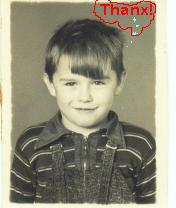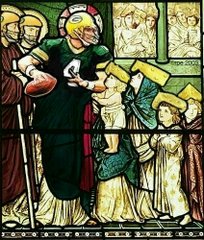
The Lutheran Reformation marks a renewal in the Church of emphasis on God’s Word and Sacraments as means of grace by which the Holy Spirit forgive our sins, creates and sustains faith in Christ, and gives us eternal life with God the Father now and forever.
All Saints’ Day in the Lutheran Church is not only a commemoration and celebration of the lives of those officially bearing the title and who have died in the faith. It is a feast celebrating the sainthood of every baptized believer in Christ and member of His holy Christian Church past. Present, and future.
In this year of our Lord, 2009, Reformation Sunday, October 25, and All Saints’ Day, November 1 mark significant events in the life of Trinity Lutheran Church of Layton, Utah in addition to their designation as feast days in the life of all Lutheran Christians. How appropriate it is that Trinity Lutheran Church of Layton, Utah would be reforming, in a sense, as an assembly of saints at a new location in this eventful time of the church calendar.
This coming Sunday, October 25, in addition to celebrating the Reformation, the people of Trinity will be holding their final worship service at the property on Golden Avenue. And a week later on All Saints’ Day, Sunday, November 1 they will hold the first Divine Service in the new sanctuary at their new location on Fort Lane Boulevard.
Missouri Synod Lutherans first gathered for worship in Layton at the City Hall, and a little later at Community Hall in what is now Layton Commons Park, back in 1945 because of the difficulty gas rationing posed to travel to the nearest established congregation—St. Paul, Ogden. From this humble beginning, Trinity Lutheran Church was incorporated on All Saints Day, 1948 under the pastoral leadership of Rev. Harold Brauer with charter members Arthur Krueger, Victor and Lillian Frank, Conrad and Clara Loe, William and Nellie Loe, Walter Sommer, Dale and Arlene Phililips, and Fritz and Ellen Aarfor.
The people of Trinity purchased land on Golden Ave., across the street from the current location, in 1954 and dedicated a converted army barracks as its original worship facility in March of 1955. The members of Trinity completed construction of the current building at 385 W. Golden Ave. and began worship there in November of 1964.
As the families and membership of Trinity grew through the 1970s and 80s, the congregation found themselves in need of more space. They expanded the facilities in 1971 to meet their worship, and business and social meeting needs . Then in 1988 added an education wing to accommodate a growing Sunday School and desire to open a Lutheran elementary school.
Trinity Lutheran Preschool opened for students of the congregation and local community in the fall of 1980, and added Kindergarten classes in 1993.
Today, the people of Trinity Lutheran Church find themselves in a struggle to maintain their distinctive, Lutheran, Law and Gospel teaching and practice of the Christian faith. In a world of uncertainty and ambiguity, Trinity Lutheran Church exists to bring the Good News of salvation and eternal life through the suffering, death, resurrection, and ascension of the Son of God, Jesus Christ. In our current climate of financial distress and spiritual potpourri this collection of forgiven sinners and baptized saints of God called Trinity has found it necessary to sell the property of their beloved church home in order to continue its ministry to the congregation and it surrounding communities.
Please remember us in your prayers and consider joining us on this Sunday for our Reformation worship service and disposition of the Golden Avenue property, and Sunday, November 1, for our All Saints Day worship service marking the opening of Trinity Lutheran Church’s new worship and education facility.
Trinity Lutheran Church will continue to celebrate the Divine Service every Sunday morning at 10 a.m. with Bible study prior to the service at 9. Trinity Lutheran Preschool will continue to hold classes on Tuesdays and Thursdays for 3 year-olds and Mondays, Wednesdays, and Fridays for 4 year-olds from 9 a.m. to Noon. We still have openings in the 4 year-old class and would like to open a Kindergarten class in the fall of 2010. Please call 801.544.5770 and ask for Pastor Hering regarding church information, or Mrs. Hering regarding preschool and kindergarten information.
By the grace of God and the power of the Holy Spirit, we pray this move from 385 West Golden Avenue to 74 North Fort Lane in Layton will provide a sanctuary for the gathering of God’s beloved people around the Word and Sacraments of His only begotten Son, Jesus Christ, for years and generations to come.
 Grace and peace to you of the repentant remnant!
Grace and peace to you of the repentant remnant!


 Grace and peace to you, brothers in Christ!
Grace and peace to you, brothers in Christ! Dear brothers in Christ!
Dear brothers in Christ! Greetings in the name of our Lord and Savior Jesus Christ!
Greetings in the name of our Lord and Savior Jesus Christ!



